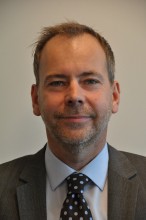No development without risk [interview]

Evert Ludding, Equity Manager at Oikocredit
After being a shareholder for five years, Oikocredit recently exited from the Zambian aquaculture company Yalelo. We spoke to Albert Hofsink, non-executive member of Yalelo’s board of directors, and Evert Ludding, Oikocredit’s Equity Manager.
Yalelo has seen impressive growth during Oikocredit's participation. From the initial 2,000 tonnes of tilapia fish production to 12,000 tonnes a year, and with the number of employees having quadrupled. That sounds like a success story. But how big was the risk?
Evert Ludding: In general, equity investments are the riskiest part of our development finance portfolio. At the same time, they can provide high social and financial returns. This investment was particularly risky at the time we bought in because of aspects such as: the early stage of the company, economic challenges in Zambia, agricultural challenges and ongoing competition from cheaply imported fish.
Now, after five years, we can say that Yalelo is in a good shape, but along the way there were always uncertainties and challenges. There are many factors that are part of success and being a minority shareholder, Oikocredit’s contribution is relevant yet also limited.
Why did Oikocredit decide to take a stake in Yalelo?
Evert Ludding: In Zambia, fish is mainly imported from China and the quality is typically poor. Also there is little value added within the country from these imports. Growing and processing fish locally and sustainably for local markets, and thus creating employment opportunities in a region with high unemployment, was a convincing project for us.
Was the duration of the equity participation fixed in advance?
Evert Ludding: No, it was not fixed but was more or less foreseen. We exit when our job is done. Generally, we expect that is after about six to eight years but we have the flexibility to time our exit responsibly and well. We saw that Yalelo was now positioned for the next stage of growth and expansion and the company is in the good hands of larger investors, including European development banks.
Investing in the equity of a company also means that Oikocredit can nominate someone to the board. What was your experience with Yalelo? What was Oikocredit able to contribute?
Albert Hofsink: In addition to regular conference calls, I attended board meetings in Zambia at least twice a year, and also regularly visited the fish farm. I'm not a fish specialist, my expertise is finance and risk management and as a former director at Oikocredit, I also brought in the social focus that Oikocredit represents. The region where Yalelo is located is underdeveloped. The fish farm has now created 800 jobs. Yalelo, where possible, also specifically brings experts from Zambia and from the region into the management. The company works with a foundation that has set up a primary school for children in the region. This is just a small part of the social impact that is important to us.
We developed and established a risk management system for Yalelo that did not exist before. Oikocredit was also able to support Yalelo by bringing in a globally recognised expert who specialises in tilapia breeding. They made a significant contribution to the development of the company.
What did you learn during your time on the Yalelo supervisory board?
Albert Hofsink: The great thing for me was that the fish farming product was tangible. I had no idea how challenging it is to breed fish sustainably and efficiently. The fishing nets, the separated ponds in the lake for feeding, fodder, refrigerated storage spaces, suitable means of transport and routes. Yalelo started from scratch and had to purchase and set up all of that. They also improved the road to the fish farm.
There are risks involved, for example the fish can get sick. The quality of the fish food is also important; if it sinks to the bottom immediately, the food has gone and only the strongest fish will grow to an acceptable size and the smaller fish may die.
Has the collaboration with Yalelo led to further new partnerships with equity investments in Zambia?
Evert Ludding: The cooperation in Yalelo has opened up many new opportunities. It has increased our profile, also beyond Zambia's borders, of an impact investor doing equity in agriculture in the region. However, we often have to say no when the opportunities don’t meet our criteria and our strategy, and in Zambia the right equity partner hasn’t been found yet. Oikocredit is committed to Zambia and actively looking for new opportunities.
This interview was conducted by Oikocredit Westdeutscher Förderkreis and published in full length in their magazine (German).
Archivo > 2020 > marzo
- 26 marzo | 2020 - Message from the Managing Director: “Working together through uncertain times”
- 19 marzo | 2020 - Oikocredit announces 2019 results and partner satisfaction [press release]
- 13 marzo | 2020 - Oikocredit and the novel coronavirus (Covid-19)
- 10 marzo | 2020 - No development without risk [interview]
